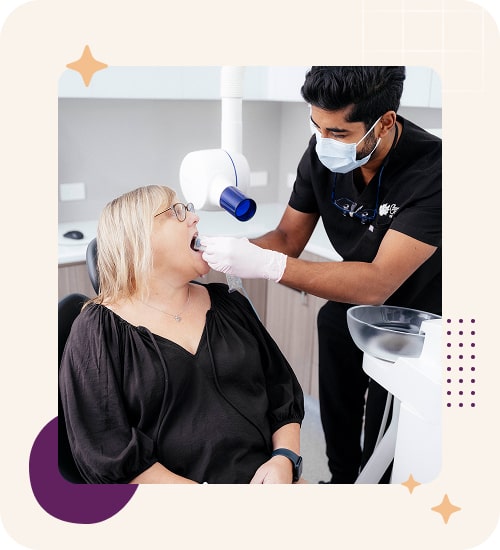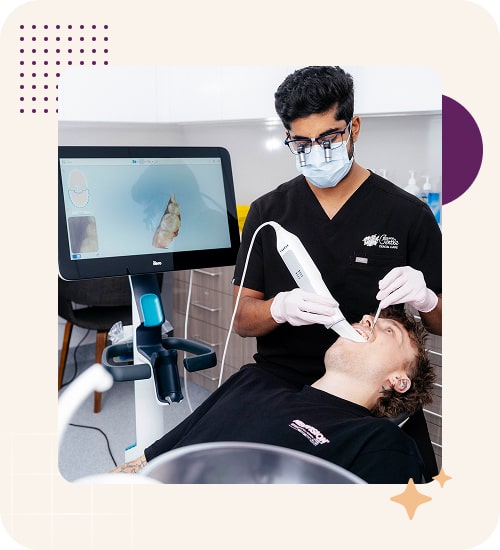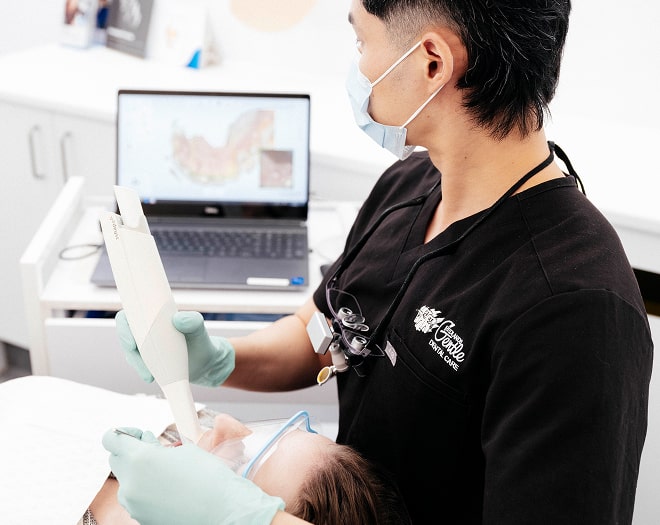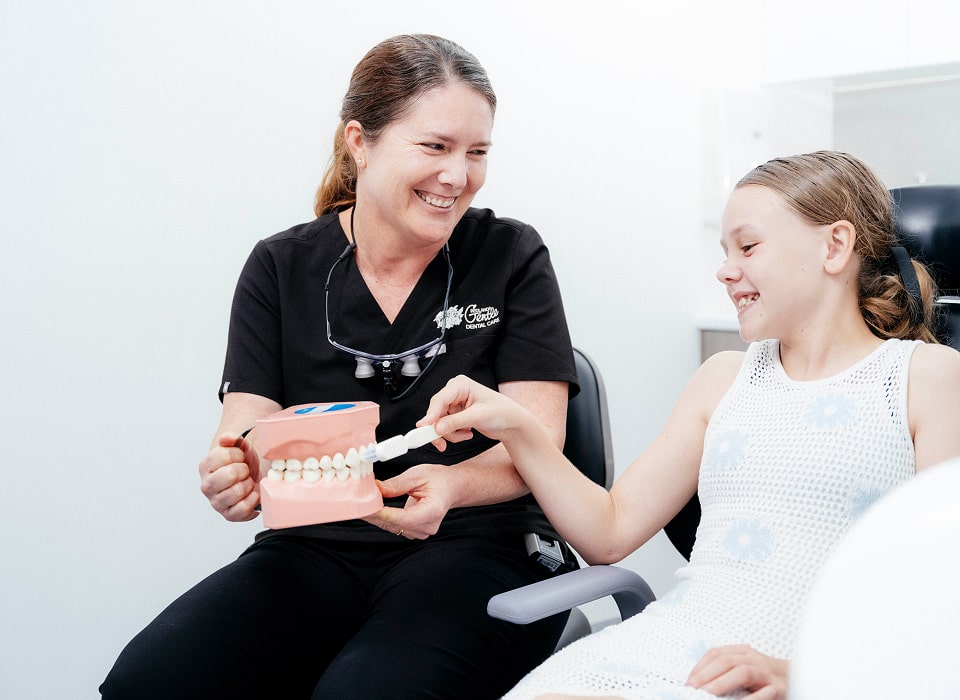Get Custom Dental Crowns that Restore Your Smile's Strength and Aesthetic
Why Choose Us
Choose Redlands Gentle Dental Care for Trusted and Quality Dental Care Services

Experience Gentle, Personalised Dental Care

Meet Our Experienced and Empathetic Team

Enjoy Comprehensive Dental Services Under One Roof

Feel at Home in Our Family-Friendly Atmosphere

Benefit from Affordable and Transparent Pricing

Trusted Community Pillar with 40 Years of History

Transforming Damaged Teeth into Stronger Ones Through a Dental Crown Procedure
Are You a Suitable Candidate for Dental Crown Placement?
Deciding if dental crowns are suitable for you requires an assessment of your dental health. At Redlands Gentle Dental Care, our team performs a thorough examination to determine your eligibility. The following describes ideal candidates for dental crowns:
- Individuals with weak or severely decayed teeth often benefit from crowns to protect against further damage and restore function.
- Patients who underwent root canal treatment may require a crown to protect the affected tooth and maintain its structural integrity.
- Those with large fillings may need a crown’s additional support to prevent the tooth from cracking or breaking.
- Individuals with discoloured teeth who find other options inadequate may find dental crowns more beneficial.


Explore the Benefits of Our Dental Crown Treatment Today
Dental crowns provide significant benefits in restoring tooth function and aesthetics. They effectively address damaged teeth and enhance your smile’s appearance, making them an essential consideration for any dental care plan. Understanding these advantages can help your decision-making process.
- Dental crowns protect weak or damaged teeth from further decay, minimising the risk of sensitivity and fracture.
- They enhance the appearance of teeth, creating a natural-looking finish that complements your smile beautifully and boosts your confidence.
- When properly cared for, dental crowns can provide durable support for oral health, lasting up to 5–15 years or even longer in some cases.
- Crowns restore chewing efficiency by reinforcing damaged teeth, promoting a comfortable and balanced bite.

Experience the Difference of Gentle Care with Us
How We Can Help
Learn How Dental Crowns Can Address Your Dental Problem
Unhappy With My Smile
My Teeth are Stained or Discoloured
Seeking Smile Improvement
Our Payment Options
Find What Works for Your Financial Needs With Our Dental Payment Options
Child Dental Benefits Schedule
Invest in your child's smile with the Child Dental Benefits Schedule (CDBS). This government program offers eligible families financial support for essential dental services, promoting good oral health habits from an early age.
The CDBS covers up to $1,095 over two years for basic dental care like check-ups, cleanings, and fillings for children aged zero to 17. Eligibility depends on Medicare status and specific government payments, making quality dental care more accessible to families.
Learn MoreDental Services for DVA Card Holders
Veterans deserve high-quality dental care, and the Department of Veterans' Affairs (DVA) program delivers just that. The program offers dental benefits that vary based on card type.
Gold Card holders receive comprehensive cover for clinically necessary treatments, from routine check-ups to advanced procedures. White Card holders are covered for dental care related to accepted service-related conditions or mental health needs. Our clinic proudly supports veterans by providing high-quality dental care to maintain their overall health.
Learn MoreHumm
Simplify your dental care payments with Humm, a flexible financing option that lets you smile now and pay later. This interest-free payment plan allows you to spread the cost of your dental treatments over time, making essential care more accessible.
Humm is available for various dental services, from routine check-ups to more complex procedures. With instant approval and the ability to manage your account online, Humm helps you prioritise your oral health without financial stress.
Learn MoreZip
We offer Zip to help patients manage treatment costs. With credit limits between $1,000 and $50,000, eligible patients can select flexible repayment terms from three to 60 months, making it easier to manage costs.
Zip is ideal for anyone needing dental care without upfront costs. The user-friendly app allows you to track payments easily, so you can stay on budget while prioritising your oral health.
Learn MoreSuperCare
With the help of SuperCare, eligible patients can release their superannuation funds early to access essential dental procedures. This option is suitable for families lacking sufficient health funds or available resources, covering services such as orthodontics, implants, and root canal therapies.
SuperCare's consultants guide you through the straightforward application process, simplifying what can often be complex. This service enables you to prioritise your family's oral health without the burden of upfront costs.
Learn MoreAfterPay
Experience the convenience of dental care with Afterpay, allowing you to receive treatments now and pay later in four easy instalments over six weeks. This payment option is available to anyone over 18, a practical choice for adults looking to enhance and maintain oral health.
With no interest charges when payments are made on time, Afterpay promotes responsible budgeting. Payments are automatically deducted from your linked debit or credit card for a smooth experience.
Learn MoreBupa Preferred Provider
Enjoy exclusive benefits and hassle-free claims when you choose our clinic, a Bupa Preferred Provider, for your dental health needs. Our patients can access a comprehensive range of services, including check-ups and major procedures, often at reduced out-of-pocket costs.
Members First Ultimate also offers 100% back on two dental check-ups and cleans every six months, making regular oral care more affordable. Our partnership with Bupa allows you to receive quality care while maximising your benefits.
Learn MoreHCF Preferred Provider
Experience affordable, high-quality dental care at Redlands Gentle Dental Care. As an HCF preferred provider, patients with eligible dental cover can access reduced out-of-pocket costs, no-gap services for selected treatments, and streamlined claims processing.
HCF members can take advantage of these benefits by choosing our clinic for their dental needs. Check your policy to understand covered treatments and annual limits, and let us help you achieve a healthier, brighter smile.
Learn Morenib Preferred Provider
Access professional dental care at our clinic, a trusted part of nib's First Choice network. As a nib Preferred Provider, we offer members the opportunity to receive quality dental care at agreed rates. This provides a transparent and straightforward experience for your dental needs.
Nib members benefit from reduced out-of-pocket costs and simplified claims processes at our clinic. To make the most of your cover, review your policy for applicable limits and service inclusions.
Learn MoreInsights Into Dental Crowns
Frequently Asked Questions
Is it painful to get a dental crown?
The dental crown placement process is not painful because the area is numbed with local anesthesia. During the procedure, the dentist prepares the natural tooth structure by removing a thin layer of enamel and placing a temporary crown to protect it until the custom crown, such as a porcelain crown, is ready.
After the custom crown is bonded to the tooth, there may be mild sensitivity or discomfort, especially around the gums. This is temporary and usually subsides quickly.
Dental crowns restore the aesthetic appearance and function of a broken tooth or damaged natural tooth structure. Proper oral hygiene practices support the crown’s long-term success and overall oral health.
How long does a dental crown usually last?
A dental crown can last between 5 and 15 years, depending on factors such as the type of crown, materials used, and individual habits.
Specific factors that affect longevity:
- Type of crown and materials:
The choice of materials, like ceramic or porcelain, influences durability. These materials are strong but may wear down faster with heavy use. - Oral hygiene practices:
Regular brushing, flossing, and dental check-ups help protect the crown and maintain the health of the tooth underneath. - Diet and habits:
Frequent consumption of hard foods and biting hard objects like ice or pens can chip or break the crown. - Underlying tooth:
Crowns placed on teeth with sufficient tooth structure tend to last longer because the foundation effectively supports the restoration. - Grinding or clenching:
Bruxism (teeth grinding or clenching) can exert excessive stress on the crown, shortening its lifespan. A night guard may help if grinding is an issue.
By choosing a suitable crown material for your needs and maintaining good oral health habits, your crown can provide years of functionality and aesthetic appeal.
How do I know when my dental crown needs to be replaced?
A dental crown may need replacing when it shows signs of wear or damage or no longer fits properly. Regular dentist visits are key to assessing the condition of your crown and identifying potential issues early.
Signs that a crown may need replacement:
- Visible damage:
Cracks, chips, or wear in the crown may compromise its durability, characteristics, and function. - Looseness or poor fit:
If the crown feels loose or moves during chewing, it may no longer provide sufficient protection. - Gum recession:
Receding gums can expose the edges of the crown or the tooth underneath, increasing the risk of decay. - Pain or sensitivity:
Discomfort around the crown could indicate underlying issues, such as decay under the restoration or changes in the tooth structure. - Changes in appearance:
Discolouration or noticeable gaps between the crown and surrounding healthy teeth may mean the crown’s shade no longer matches them.
If you notice any of these symptoms, consult your dentist to determine whether your crown needs to be replaced.
How many times can a dental crown be replaced?
The number of times crowns for teeth can be replaced depends on several factors, including the condition of the underlying tooth, the quality of the crown material, and how well it has been maintained. In general, a dental crown can be replaced multiple times as long as the tooth beneath it remains healthy and structurally sound.
It’s important to maintain regular dental check-ups to assess the condition of both the crown and the underlying tooth. If the tooth becomes too compromised, alternative treatments may be recommended.
How long can I leave a dental crown off a tooth?
Leaving a crown off a prepared tooth for too long can lead to several complications. A dental crown procedure involves fitting a custom-made dental crown over a prepared tooth to protect it and restore its function. When the crown is removed or not placed promptly, the tooth underneath becomes vulnerable to damage, decay, or shifting.
Why timing is crucial:
- Tooth sensitivity and decay:
The prepared tooth is exposed without the crown’s protection. This can lead to sensitivity and an increased risk of damage, especially for decayed teeth or teeth that have had root canal treatments. - Shifting teeth:
Natural teeth may shift or move into the space left by the missing crown. This can disrupt your bite and complicate further dental restoration. - Compromised natural tooth surface:
The exposed tooth surface can weaken over time, making it harder to place a crown in the future.
Recommendations:
- It’s essential to have a dental crown fitted or replaced immediately after it is removed.
- Maintaining good oral hygiene during this time is crucial to minimise the risk of complications.
Custom-made dental crowns are designed to provide a natural appearance and long-term durability. Delaying their placement could compromise the tooth’s health, function, and appearance. Always consult your dentist if a crown becomes loose, dislodged, or is off for any reason.
Do teeth decay under crowns?
Teeth can decay under a crown if the area where the crown meets the natural tooth is not kept clean. While one of the key benefits of crowns for teeth is protecting the tooth and restoring its function, the underlying tooth is still susceptible to decay if bacteria accumulate around the edges and spread underneath the crown.
How decay can occur:
- Gaps or loose crowns:
If the crown becomes loose or damaged, food particles and plaque can enter, leading to decay. - Poor oral hygiene:
Inadequate brushing and flossing can allow bacterial plaque to build up around the base of the crown.
Preventing decay:
- The dental crown procedure involves securely bonding the crown to the tooth, minimising gaps. However, maintaining proper oral hygiene, including brushing and flossing, is essential to keep the area clean.
- Regular visits to your dentist for cleanings help remove bacterial plaque around the crown, reducing the risk of decay.
Following these practices can maximise the dental crown benefits while protecting the tooth underneath.
What are the disadvantages of dental crowns?
While dental crowns offer many benefits, such as protecting the natural tooth core and restoring functionality, there are some potential disadvantages to consider.
Potential drawbacks:
- Cost of dental crowns:
The more durable the material used for the dental crown, the higher the cost; however, it also provides greater longevity. - Tooth preparation:
The dental crown procedure involves removing part of the natural tooth structure to fit the crown. This alteration is necessary but irreversible. - Sensitivity risk:
Some patients experience temporary sensitivity in the tooth or surrounding gums, especially after placement. - Replacement over time:
Even durable crown types eventually wear out. Replacement may be needed to maintain the dental crown in the long term.
Despite these potential issues, the dental crown benefits, including protecting the entire crown of the tooth and improving bite strength, make them a reliable choice for long-term restorations.
What is the difference between a dental crown and a dental bridge?
A dental crown and a dental bridge serve different purposes in restorative dentistry, depending on whether the goal is to restore a single tooth or replace missing teeth.
Key differences:
- Purpose:
- A crown covers and strengthens a single tooth. It helps restore the natural tooth structure, especially after damage or decay.
- A bridge is designed to replace one or more missing teeth by anchoring to adjacent teeth or dental implants, filling gaps left by the extracted teeth.
- Structure:
- Crowns focus on protecting and restoring the entire tooth.
- Bridges consist of multiple units, including crowns on supporting teeth and a false tooth (pontic) to replace the missing tooth.
A crown is ideal for restoring a damaged or weakened tooth, while a bridge is indicated for addressing tooth loss. Both options, when fabricated from durable materials, provide long-term functionality and enhance the look of your smile.
How much does a dental crown cost?
Several factors influence the cost of dental crowns. Here’s a breakdown of what affects the price:
- Type of material used:
The choice of material significantly impacts the cost. For example, ceramic and porcelain crowns usually range between $1700 and $1900, while full metal crowns can cost $1700 to $2200. Porcelain-fused-to-metal crowns for teeth are slightly less, ranging from $1600 to $2000. - Tooth location:
Crowns for molars, which require extra strength, may use materials like full metal or porcelain-fused-to-metal, affecting the price. - Preparation required:
Additional treatments, such as dental cleaning or root canal treatment, can increase the cost of dental crowns. - Dental laboratory work:
Crowns made in a high-quality dental laboratory for precision and customisation may cost more. - The case’s complexity:
Cases involving significant damage or alignment adjustments may require more extensive work, influencing the price.
For a detailed estimate tailored to your needs, we recommend booking a consultation to discuss your options and the cost of dental crowns in your specific situation.
Is there an alternative to a dental crown?
Yes, there are alternatives to dental crowns, depending on the condition of your tooth and the desired outcome. While crowns are popular for their durability and ability to restore the natural tooth structure, other options may be suitable for less severe cases or specific needs.
Common alternatives:
- Tooth Fillings:
For minor damage or decay, a tooth filling may suffice to restore the affected area without covering the entire tooth. - Inlays and Onlays:
These are custom-made restorations that fit into or over the damaged portion of a tooth. They are less invasive than crowns and ideal for moderately sized decay or damage while preserving more of the natural tooth structure. - Dental Bonding:
A tooth-coloured resin can be applied to address small chips or cracks. This is a quicker and more affordable option but is only suitable for minor aesthetic concerns. - Veneers:
Veneers are thin shells placed on the front surface of a tooth. They offer a cosmetic alternative for improving the appearance of damaged or discoloured teeth. However, they are for aesthetic improvements rather than structural restoration.
The choice depends on the tooth’s condition, the extent of damage, and your long-term goals for durability and appearance. Your dentist can assess your specific situation and recommend the most appropriate treatment option.
